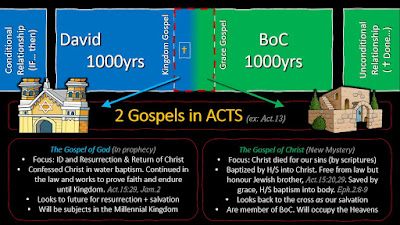Q-A: What does it mean that we are not under law?
Q-A: What does it mean that we are not under law?

Romans 6:14 For sin shall not have dominion over you, for you are not under law but under grace.
Paul says we are not under law?
In a nutshell, it means to live as Christians today in the liberty of the Spirit without being bogged down by external laws that dictate or hinder our service to God. It does not mean to forego all laws and rebel against the government, our parents or guardians and just do as we please. No! This will not reflect our duty and lifestyle to God and as an example to others. Laws are laws and they are there for a reason. What Paul means by the statement, "we are not under the law...", is that we are not to come under the bondage of 'Man's law', ---that is to fall into the bondage of traditions or rituals or observances and practices. These are things that promote men and really have no part in the design of God for your life and liberty.
For a more detailed article on this topic, read this very informative post: The Meaning of 'Not under Law' in the Grace Dispensation.
I'd like to include a part of an article here (below) that was written by Shawn Brasseaux on his site: https://forwhatsaiththescriptures.org/2015/08/15/hebrews-10-25/. It very nicely confirms and provides an additional angle to this topic of law today. (Please make sure to read Shawn's full article too for the proper context.
Remember, God only gave one religion in all of human history. Given at Mount Sinai through Moses for him to teach it to Israel, Judaism was a system of 613 laws (listed throughout Exodus through Deuteronomy). The Mosaic Law was a very severe system. God gave it to thoroughly demonstrate that Israel could never become His people in her own strength and through her own efforts. He would have to work to make them His people. Alas, Israel never got the message that she was a sinful nation that needed God’s salvation. She still believed she could do everything God commanded. (Just like today’s legalists!) Eventually, through the centuries, Israel’s religious leaders added more and more laws. When we come to Jesus’ earthly ministry, Judaism was no longer pure. Paul even called it the “Jews’ religion” (Galatians 1:14). It was not God’s religion anymore because sinful Israel had corrupted it.
The Lord Jesus remarked about Israel’s spiritual condition in His day:
"[6] Well hath Esaias prophesied of you hypocrites, as it is written, This people honoureth me with their lips, but their heart is far from me. [7] Howbeit in vain do they worship me, teaching for doctrines the commandments of men. [8] For laying aside the commandment of God, ye hold the tradition of men, as the washing of pots and cups: and many other such like things ye do. [9] And he said unto them, Full well ye reject the commandment of God, that ye may keep your own tradition" (Mark 7:6-9).
Does this rebuke’s focus sound familiar? Sure it does! "Tradition" is still readily accepted instead of Scripture. Patristic (church fathers) writings, denominational creeds, papal encyclicals, church council decrees, and myriads of other volumes mean everything in Christendom, but the Holy Scriptures mean almost nothing (unless a verse can bolster the denomination, and then it is ripped out of context and quoted—such as Hebrews 10:25!).
I trust that the information and links here will help you to get clarity on the what Paul means and provide you the knowledge to identify and avoid falling into the traps of law and rather to find the liberty of the Spirit and the freedom to serve God and the body of Christ in love and conviction.
God bless.



Comments
Post a Comment